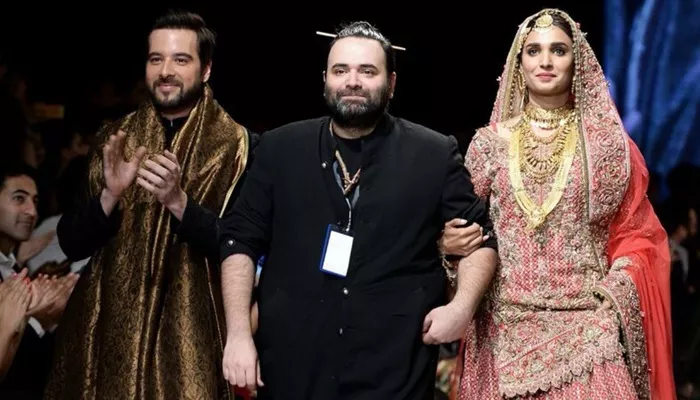In Pakistan, a startling statistic reveals that nearly 99% of women are denied at least one essential right on their Nikahnama (marriage contract). This is particularly striking in a country where brides-to-be carefully plan every detail of their wedding— from the attire and makeup to the venue and jewelry. Yet, when it comes to the Nikahnama, women are often excluded from any meaningful input or decision-making.
This oversight is even more troubling given the widespread practice of crossing out important columns in the Nikahnama— a practice that continues despite being outlawed under the Punjab Muslim Family Law Ordinance of 1961. The exclusion and violation of women’s rights on this critical document raise serious concerns about gender equality in the marriage process.
This wedding season, when brides were enamored with the latest bridal trends, fashion designer Fahad Hussayn used his platform to address this issue through a striking new jewelry collection. Launched in collaboration with the Centre for Human Rights (CFHR), Hussayn’s bridal jewelry line did more than just showcase luxury pieces; it served as a powerful reminder to brides and their families to safeguard women’s rights within the Nikahnama.
The collection, which featured thorn-embedded designs, symbolized the painful consequences of crossed-out sections on the Nikahnama— an unsettling visual metaphor for the “thorns” that may arise in a woman’s married life when her rights are not clearly defined. This symbolic message was brought to life in a poignant video featuring actress Ramsha Khan as a bride, set against a hauntingly beautiful soundtrack. The campaign’s key message was clear: don’t let future marital struggles take root by neglecting women’s rights from the very beginning.
“For me, fashion and advocacy go hand in hand,” Fahad Hussayn remarked. “The thorns within the jewelry represent how painful the crossed-out columns on the Nikahnama can be for a woman. This wedding season, our message is simple: #KaanteNaLagao (Don’t Let Thorns Happen). The Nikahnama is more than just a formality; it is the foundation for respect and equality. This campaign encourages women to understand and assert their rights.”
The campaign also introduced a charitable component, in collaboration with Bridal Couture Week, by auctioning a thorn-embedded bangle. All proceeds from the auction will go toward providing legal aid for women who cannot afford to navigate the complex legal system to assert their marriage rights. Actress Ramsha Khan highlighted the importance of the campaign’s dual role in both raising awareness and providing tangible support for women in need.
To take the campaign further, CFHR has partnered with Depilex, a renowned beauty salon chain, to directly engage brides during their most leisurely time— while preparing for their wedding. Sevim Saadat, Co-Founder of CFHR, explained, “While the metaphor and video have captured attention, we understand the importance of moving the campaign from the abstract to the actionable. Through our partnership with Depilex, we aim to educate brides about their rights while they are at the makeup station, right before their wedding.”
The campaign has already sparked significant engagement, with the CFHR receiving inquiries from women seeking more information about their rights and how to ensure their Nikahnama is properly filled out. Through these efforts, the campaign has leveraged the wedding season to shed light on a critical issue— the implications of incomplete or crossed-out clauses in the Nikahnama, which can have lasting effects on women’s marital rights and security.
In addition, women, girls, or anyone seeking legal guidance or advice regarding marriage rights can now call the National Commission for Human Rights helpline at 1413, a dedicated resource aimed at offering support for marriage-related legal issues.
A recent diagnostic study of Nikahnamas in Punjab, published by the CFHR in collaboration with the National Commission for Human Rights and Musawi Private Limited, paints a troubling picture of widespread neglect of women’s rights. The study found that 89% of brides surveyed were not granted both Dower Rights (DRD) and monthly maintenance in their Nikahnama. Only 8% had the right to maintenance but lacked the DRD, 2% had the DRD but no monthly maintenance, and a mere 1% had both rights fully documented.
Through his bold and timely campaign, Fahad Hussayn is making a powerful statement about the importance of ensuring women’s marriage rights are respected from the very first step of the process— the signing of the Nikahnama. With continued advocacy and legal support, this initiative aims to foster a future where women no longer have to fear the “thorns” that may stem from their marital contracts.
Related topic:
PNJ Hosts Exclusive Jewelry Events to Celebrate the Holiday Season
Deepika Padukone Embraces Festive Elegance with Cartier Jewelry
Hailey Bieber Celebrates Motherhood with Stunning New Jewelry


